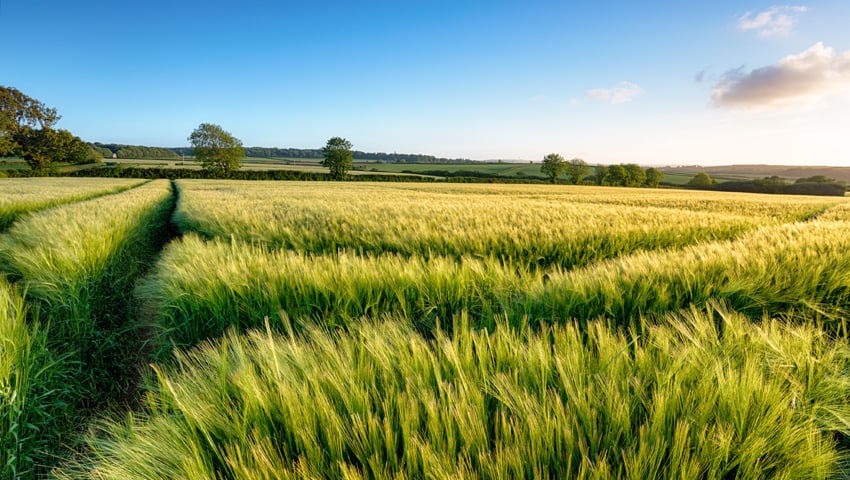Waitrose has committed to support more than 2,000 of its British farmers to move to nature-friendly farming practices, helping to boost financial resilience of farms in the long-term and combat the effects of climate change.
This comes in response to an industry wide need to move to more resilient farming methods and demand from Waitrose customers: four in ten are worried about the impact that modern farming has on nature and wildlife.
Regenerative agriculture is a way of farming that focuses on improving the health of the soil and the environment, making it healthier and more productive. It helps tackle issues such as top-soil erosion – the loss of the most fertile layer of soil – which is being accelerated by some farming methods and can make it harder to grow crops. This, among other concerns, is why change is needed now to ensure food security in the future.
Unveiling the plans to its British farmers at the Waitrose farm in Hampshire, the Leckford Estate where Waitrose has been farming regeneratively since 2020, Executive Director James Bailey committed the supermarket to play its part revolutionising the British food system.
In his speech to farmers, James Bailey announced that Waitrose will work with them to produce food that works in harmony with nature, to source meat, milk, eggs, fruit and vegetables from UK farms which use regenerative practices by 2035.
In turn, we hope this will protect British farmers against the effects of climate change, enhance nature and ensure customers can buy the best and most delicious British-grown produce for many years to come.
Waitrose will:
- Develop plans for our British farmers to access affordable finance and provide resources to support their transition to regenerative and low carbon farming
- Provide a market for regeneratively produced food in Waitrose shops and online
- Have a permanent Centre of Excellence at our Leckford farm, providing practical tools, workshops, online resources and mentoring to help farmers to make the shift to regenerative agriculture
- Work with a group of farmers to develop our understanding of regenerative practices across different supply chains, tailored to farming types and then scale these into supply chains
- Complete a ‘state of nature’ assessment by 2026 of all our own brand UK farms and create land management plans so farmers and growers can improve priority habitats and support thriving biodiversity
- Undertake field trials and new innovative practices at our Leckford farm, which will help inform our approach to regenerative practices in our supply chains
Speaking to farmers at the Waitrose farm, James Bailey, Waitrose Executive Director, said, “We want Waitrose customers to know that when they shop with us, they are voting with their purses and wallets for a food system that restores and works in harmony with the natural world, and that supports a financially sustainable future for British farmers.
“We have a duty to help our farmers make the move towards more nature-friendly growing, and we’re committed to playing our part in the revolution that our country’s food system requires.”
Key parts of the plan include collaborations with LEAF and the University of Reading.
Together with LEAF (Linking Environment And Farming), we are rolling our LEAF certification globally to all fresh produce growers by 2026. LEAF has also developed written advice for farmers covering four crucial categories: soil, carbon, biodiversity and water.
With LEAF, we are setting up eight satellite farms in the UK on a three-year programme representing a range of farming sectors including beef, dairy, pig, poultry, top and soft fruit, root vegetables and glasshouse. The aim will be to produce best practice guidance that has been tested and shared more widely in supply chains, making it easier for farmers to know what really works and the impact changes could have and what they might cost.
David Webster, Chief Executive, LEAF said, “The agri-food sector increasingly recognises the urgent need to adopt farm management practices that sustain the natural environment while building resilience.
“We believe it is only by grounding interventions at farm level, within the context of working farm businesses that we can effectively accelerate change at pace and scale. We are therefore delighted to be supporting our longstanding food retail partner Waitrose on Farming for Nature – a highly innovative and far-sighted project.”
Alongside University of Reading, we are establishing a three-year Knowledge Transfer Programme backed by a grant from the UK Research and Innovation (UKRI). This partnership, with this highly regarded agricultural university, aims to bridge the gap between cutting-edge agricultural research and practical farming applications, giving farmers a direct resource to information to implement on their own farms.
Professor Carol Wagstaff, Research Dean for Agriculture, Food and Health at the University of Reading said, “Reading has more than a century of expertise in agricultural innovation, and we know that to secure our food and nature in the century ahead, we need to make long-term plans.
“Farmers, researchers, retailers and shoppers all have a part to play. Farming for Nature provides the leadership to make Britain’s food system a force for good in fighting climate change and biodiversity loss, while remaining profitable.”
